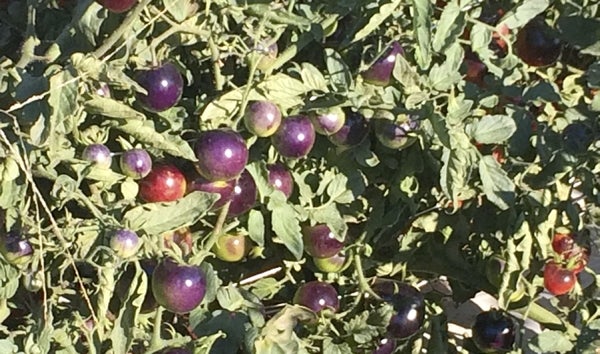Cooler weather prompting more questions
Published 12:00 am Friday, September 18, 2015

- Cooperative Extension Black tomatoes have become very popular. Many are heirloom types.
By Danelle Cutting
Cooperative Extension
The weather this week has been wonderful. I have actually been able to stay outside for long periods of time without sweating half to death. With that being said, my clients have also been outside, coming in contact with nature.
Here are a few questions that I encountered this week:
Question: I was riding my four-wheeler and parked on top of this nest. What are these insects, and do they sting?
Answer: These are the dreaded yellow jackets and how on earth you did not get stung is beyond me. They usually attack lawnmowers and do not like loud noises disturbing their nest. They are often confused with bees, but yellow jackets are usually much thinner and with less hair. They also enjoy nests in the ground, rotten posts, and I have even seen them in tree cavities. They are very active in the fall and enjoy being around trash cans and sweetened beverages so if you are outside, make sure you keep these things contained. For more information on yellow jackets and how to control them, visit our publication website at: http://www.ces.ncsu.edu/depts/ent/notes/Urban/horn-yj.htm
Question: What are these purple things that look like tomatoes?
Answer: This is a variety of black tomatoes, and their color is amazing. Tomatoes can come in a variety of colors and stripes. They are quite a unique plant. The black varieties of tomatoes have become fairly popular. Many of the seed catalogs are promoting the odd varieties. Some of the black varieties have done very well in the raised bed trials at the office. I am not sure what variety the photos depict, but there are a few popular varieties such as Black Krim, Black Russian, Indigo Rose and many others. Their flavor is definitely unique. Most of the black varieties are open pollinated or what is also known as heirloom.
Question: What is this worm?
Answer: This is not a worm. This is a monarch caterpillar, munching on your annual milkweed. This variety of milkweed is the only one that the monarchs can use to complete their lifecycle. At the office, I counted 11 monarch caterpillars on our milkweed. I am just hoping all of them make it to adulthood. For more information on butterflies, check out this Extension publication: http://content.ces.ncsu.edu/butterflies-in-your-backyard.pdf
Question: Can I eat the fruit from my quince?
Answer: Yes, but many process the fruit into jams, jellies and syrups before eating. There are numerous recipes on the internet and some in cookbooks. I have never tried them before, so I can’t really describe the flavor. If any of my readers have tried them, I would love to know what you think about their taste.
If you have questions concerning your garden, insects on the flowers, or interesting tomatoes, call your local agent, Danelle Cutting, at 704-216-8970.




